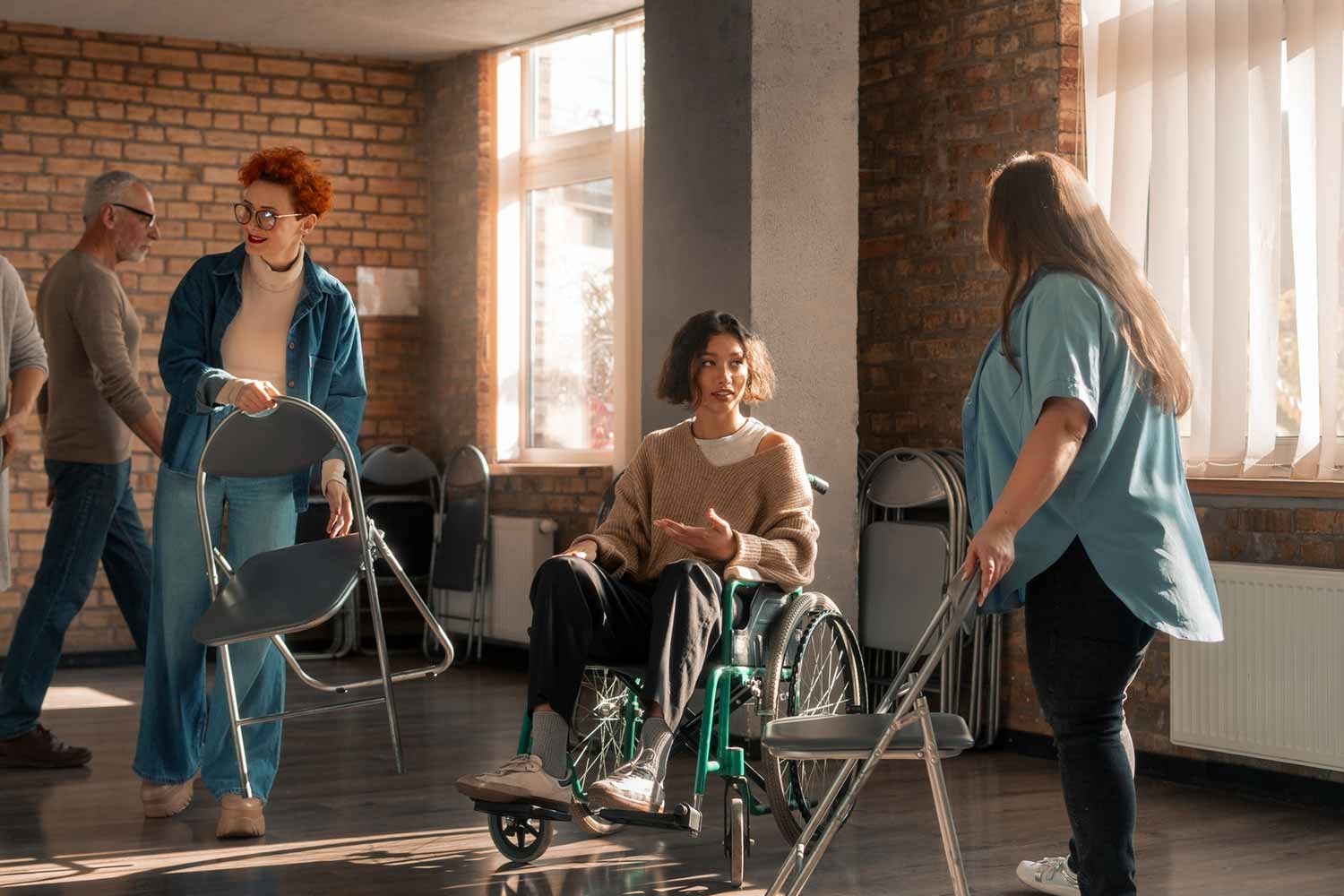Life is a journey, and for adults with disabilities, navigating everyday routines can sometimes present unique challenges. The right kind of support can make a remarkable difference, enabling individuals to live meaningful, independent lives.
Supported independent living in Adelaide is designed to provide practical assistance while respecting personal autonomy. They offer a structured framework where support is available when needed, yet independence is encouraged at every step.
With the help of My Life My Way, adults with disabilities can navigate daily life with confidence, making choices that suit their lifestyle and preferences.
Understanding Supported Independent Living
Supported independent living is a model of care that focuses on promoting autonomy, dignity, and self-reliance among adults with disabilities. In Adelaide, these services provide a safe and supportive environment where individuals can live independently while accessing assistance tailored to their needs.
Unlike traditional care models, supported independent living is not about managing every aspect of life for someone. Instead, it is about enabling choice, providing guidance, and building confidence.
The core philosophy of supported independent living is to foster independence through practical support. Assistance can include help with daily routines, personal care, meal preparation, household management, transportation, or accessing community activities.
Each service is designed to accommodate individual requirements, ensuring that residents can live comfortably while developing essential life skills.
The Importance of Autonomy and Choice
Autonomy is central to supported independent living. Adults with disabilities benefit from having the ability to make decisions about their own lives. Small choices, such as deciding what to eat for dinner or how to spend free time, may seem routine but play a vital role in reinforcing independence.
My Life My Way encourages individuals to take control of their day-to-day life, helping them make decisions that align with their values and preferences. Allowing individuals to exercise choice fosters self-confidence and encourages responsibility.
When people are supported in making decisions rather than having choices made for them, they gain a sense of control over their own lives. Over time, these daily decisions help develop critical problem-solving skills, improve self-esteem, and promote long-term independence.
Developing Essential Life Skills
Supported independent living is not solely about assistance; it is also an opportunity for skill development. Life skills training is a cornerstone of these services, helping residents acquire the knowledge and abilities they need to manage their day-to-day lives.
This can include cooking, cleaning, budgeting, planning schedules, using public transport, and managing personal appointments. Services are tailored to individual needs, allowing residents to progress at their own pace.
For example, someone may begin by learning basic cooking techniques and gradually move towards planning and preparing full meals. This step-by-step development builds confidence and reinforces independence.
By equipping residents with practical skills, supported independent living prepares them for a more active role in their communities.
Promoting Social Connections
Social interaction is vital for well-being, and supported independent living programs actively encourage community engagement. Adults with disabilities often face social isolation, which can affect emotional health.
SIL addresses this by fostering environments where residents can interact with peers, staff, and the broader community. Activities may include group outings, recreational programs, volunteering opportunities, and participation in local events.
These experiences enable individuals to build meaningful relationships, strengthen communication skills, and create a sense of belonging. My Life My Way emphasises the importance of social engagement and personal connection, helping individuals integrate more fully into their communities.
Personalised Support to Meet Individual Needs
One of the most significant advantages of supported independent living in Adelaide is the individualised support it provides. No two people have the exact needs, and SIL services recognise this by offering tailored assistance.
Some residents may require help with personal care, while others may benefit more from guidance in managing household responsibilities or community engagement. Personalised support ensures that residents receive assistance that enhances their independence rather than diminishing it.
Staff work closely with individuals to develop care plans that reflect their preferences, abilities, and goals. This approach empowers residents to take ownership of their lives while having access to assistance when needed.
Fostering Confidence and Emotional Well-being
Confidence and emotional well-being are closely linked to independence. When adults with disabilities are supported in making choices and managing their own lives, they experience a sense of achievement that positively impacts mental health.
Successfully completing tasks, learning new skills, and navigating challenges can boost self-esteem and promote resilience. SIL programs also provide reassurance through trained staff who offer guidance in unfamiliar situations.
Knowing that support is available reduces anxiety and encourages residents to try new activities or explore personal interests. Over time, these experiences contribute to a stronger sense of self, increased motivation, and improved overall well-being.
Encouraging Community Engagement
Active participation in the community is an essential component of supported independent living in Adelaide. Services encourage residents to explore local events, educational opportunities, recreational activities, and volunteer work.
Engaging with the community not only develops social skills but also fosters a sense of belonging and purpose. Community involvement can help individuals build connections outside the supported living environment, opening opportunities for personal growth and learning.
By promoting participation in everyday life, SIL programs contribute to the holistic development of residents, empowering them to live fully and independently.
Strengthening Families and Support Networks
Supported independent living benefits not only the individuals it serves but also their families and support networks. Families often find reassurance in knowing their loved ones have access to consistent, reliable support while maintaining independence.
This balance allows families to focus on quality interactions rather than constant caregiving, promoting stronger and healthier relationships. My Life My Way works closely with families to ensure that support aligns with individual needs while fostering independence.
Families are encouraged to be involved in planning and monitoring care, helping maintain a consistent and supportive environment for residents.
Creating a Safe and Accessible Living Environment
Safety and accessibility are essential aspects of supported independent living. Residences are designed or adapted to accommodate individual needs, minimising risks and promoting independence. Staff are trained to assist residents safely while encouraging them to take an active role in managing their environment.
A safe living environment allows individuals to explore their capabilities confidently, learn new skills, and engage in everyday activities. Feeling secure and supported enhances independence and contributes to a positive quality of life.
Celebrating Achievements
Recognising and celebrating achievements is a key element of supported independent living. Accomplishments, whether large or small, reinforce personal growth and motivate continued development.
Learning a new skill, maintaining a routine, or engaging in a community activity are all milestones that demonstrate progress.
Celebrating achievements provides positive reinforcement, helping residents feel capable and valued. This approach encourages ongoing growth, builds self-confidence, and fosters a sense of pride in personal accomplishments.
Long-Term Impact of Supported Independent Living
The long-term benefits of supported independent living are profound. Adults with disabilities gain independence, self-confidence, and practical skills that enable them to lead more fulfilling lives. Social connections, emotional well-being, and community engagement are all enhanced through SIL services, contributing to a richer quality of life.
My Life My Way shows how structured support can empower individuals to pursue personal goals, develop meaningful relationships, and actively participate in their communities. The impact extends beyond daily routines, fostering growth, resilience, and self-determination.
Conclusion
Supported independent living is a transformative approach that empowers adults with disabilities to live fulfilling, self-directed lives. By combining personalised support, skill development, social engagement, and safety, services provide the foundation for independence, confidence, and personal growth.
Supported independent living in Adelaide enables residents to make choices, manage daily routines, and actively participate in their communities. This model of support emphasises dignity, empowerment, and inclusion, helping adults with disabilities lead lives defined by independence, purpose, and connection.
Supported independent living is not just about assistance; it is about creating environments where adults with disabilities can thrive, achieve their goals, and live life fully. My Life My Way provides supported independent living for adults with disabilities, helping them live safely and comfortably while maintaining their independence.
We focus on creating a supportive environment where individuals can make choices about their daily lives. Our services ensure practical assistance, companionship, and guidance to enhance quality of life.



